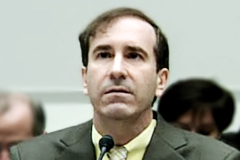Published: February 2009
Last December, shortly after news broke of investment manager Bernard Madoff’s alleged $50 billion Ponzi scheme, the Securities and Exchange Commission (SEC)—the federal agency that regulates the securities industry—admitted that it had received warnings about Madoff from an investment analyst. That analyst—dubbed the “Madoff whistleblower” in the media—Harry Markopolos, testified before a U.S. House of Representatives Financial Services subcommittee on February 4 about his repeated efforts to warn the SEC that Madoff was running a scam.
For Markopolos, the appearance before Congress marked the culmination of an investigation he began a decade ago when his supervisor at Boston’s Rampart Investment Management Company assigned him to conduct “competitive research” on Madoff’s investment strategies. “Again and again, he could not simulate Madoff’s returns, using information he had gathered about Madoff’s trades in stocks and options,” according to the Boston Globe. “Madoff seemed to make money whether stock markets went up or down, a red flag to Markopolos.”
Markopolos informed the SEC of his suspicions in 2000 and several times thereafter. In 2005, he sent the agency a list of 29 “red flags” in a memorandum titled “The World’s Largest Hedge Fund Is a Fraud.” It concludes, “The elaborateness of BM’s fund-raising, his need for secrecy, his high 16 percent average cost of funds and reliance on a derivatives investment scheme that few investors (or regulators) would be capable of comprehending, lead to a weight-of-the-evidence conclusion that this is a Ponzi scheme.” But the SEC did nothing, Markopolos told congressmen. It was an “abject failure by the regulatory agency we entrust as our watchdog.”
In a career that has included investment management, a stint in the U.S. Army as special operations commander of a clandestine overseas operation, and the presidency of the Boston Security Analysts Society, Markopolos has established a reputation for keen analysis, integrity, and persistence. “Bulldog” is the word finance professor Alan Marcus used to describe him in an interview with the Heights. “When he feels something is wrong, he really doesn’t let go,” said Marcus. Markopolos left Rampart in 2005 and began his own “forensic investigation” business. “My typical cases are $500 million and up,” he writes, “and involve CEO and CFO top management-led fraud schemes.”

